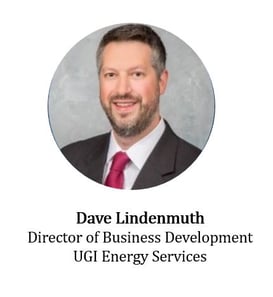UGI Energy Services continues to invest in energy sources that provide customers with energy solutions that are innovative, efficient and beneficial to the environment. Such sources include renewable natural gas (RNG). The UGI Energy Services communications team recently discussed RNG with Director of Business Development Dave Lindenmuth to help customers better understand the fuel, its benefits and its outlook for production and consumption growth.
 Q: What is renewable natural gas, and how is it produced, stored and transported?
Q: What is renewable natural gas, and how is it produced, stored and transported?
Dave: Renewable natural gas (RNG) is biogas produced from the breakdown of organic materials including trash, food waste, animal manure, and wastewater sludge. The biogas is then cleaned and processed of any contaminants until it is fully interchangeable with conventional natural gas. One of the significant benefits of RNG is that it can be injected directly into America’s existing, extensive natural gas pipeline system—allowing RNG to be transported, stored, and utilized as natural gas.
Q: How is renewable natural gas used?
Dave: The most common use of RNG in the United States is in the vehicle fuel market to power compressed natural gas (CNG) vehicles. This is due to the fact that the federal government, California, and several other states provide environmental credits when RNG is used for transportation to displace the use of gasoline and diesel fuel. Renewable Natural Gas is also increasingly used for all applications where conventional natural gas is utilized, including power generation, thermal load, industrial processes, heating, and other applications.
Q: What are the environmental and climate benefits of renewable natural gas?
Dave: RNG provides several environmental and climate benefits in a number of ways. When examining the lifecycle of an RNG project, it is clear how it contributes significantly to the global carbon and methane reduction initiatives. First, the collection of biogas from the numerous feedstock sources for RNG has led to improved waste collection and manure management strategies greatly reducing or eliminating methane emissions directly to the atmosphere. RNG projects on farms have also improved water quality by reducing runoff contamination caused by the direct application of manure to fields for fertilizer. In addition, the use of RNG in vehicles has reduced regional smog and reduced gasoline and diesel fuel emissions.
Q: What is UGI Energy Services’ involvement in the renewable natural gas market?
Dave: With the acquisition of GHI Energy in July 2020, UGI Energy Services became a leading marketer of RNG to transportation fleets in California. With additional investments upstream in production and midstream assets in the RNG field, UGIES is continuing to expand its presence in the RNG market. The business development team is currently working on projects that will produce RNG from wastewater, food waste, livestock manure, and landfills throughout the United States. Our retail commodity marketing and supply groups are also working with customers to develop RNG procurement and supply deals.
Q: Are there state and/or federal policy measures that can help bring more renewable natural gas into our energy mix?
Dave: Yes, the current long-standing federal Renewable Fuel Standard (RFS/RIN program) and the California Low Carbon Fuel Standard (LCFS) provide the primary incentives for the development of RNG. However, state efforts to provide financial incentives for the agricultural community to utilize naturally occurring sources of biogas would be very helpful to the long-term economic vitality of smaller farms. RNG procurement programs for natural gas utilities would also help expand the market. Additional RNG projects would certainly be developed if states implemented RNG requirements as part of the overall natural gas supply mix in their states, similar to solar rules that were implemented in many states years ago. Additional transportation credit programs or incentives for thermal and power load would also provide RNG developers the confidence they need in future markets to build more projects. Finally, some farm management and water runoff policies can also be the catalyst for farms to implement new manure management programs that result in ancillary RNG projects.
For more information on Renewable Natural Gas, contact Dave Lindenmuth (dlindenmuth@ugies.com) or John Cook (jcook@ugies.com).
Visit our Renewable Energy page to learn more about other renewable energy options.




